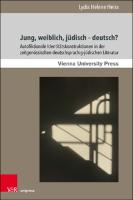Jung, weiblich, jüdisch – deutsch?
Autofiktionale Identitätskonstruktionen in der zeitgenössischen deutschsprachig-jüdischen Literatur (Volume 15, Edition 1)
| dc.contributor.author | Heiss, Lydia Helene | |
| dc.date.accessioned | 2021-05-14T03:31:23Z | |
| dc.date.available | 2021-05-14T03:31:23Z | |
| dc.date.issued | 2020 | |
| dc.identifier.uri | https://library.oapen.org/handle/20.500.12657/48611 | |
| dc.description.abstract | Eine Liebeserklärung an Deutschland der jüdischen Autorin Lena Gorelik in ihrem semi-autobiografischen Text »Lieber Mischa« wirft die Frage auf, ob der Holocaust noch immer Ausgangspunkt und zentrales Merkmal des Selbstverständnisses der gegenwärtigen bzw. dritten jüdischen Schriftsteller*innengeneration in Deutschland ist. Neben Goreliks Werk werden auch »Vielleicht Esther« von Katja Petrowskaja und »Der Russe ist einer, der Birken liebt« von Olga Grjasnowa auf diese Frage hin untersucht. Die drei jüdischen Schriftstellerinnen sind aus Osteuropa zugewandert, leben in Deutschland und schreiben auf Deutsch. Ihre Texte wurden nach 2010 veröffentlicht und gehören dem Genre der Autofiktion an. Die Analyse der literarischen Identitätskonstruktionen zeigt, dass die in Deutschland den Jüd*innen zugewiesene Sonderrolle als ›Opfer des Holocausts‹ oder als ›Exot*innen‹ tendenziell abgelehnt wird und der Wunsch nach einem ›normalen‹ Leben an deren Stelle tritt. A declaration of love for Germany by the Jewish author Lena Gorelik in her semi-autobiographical text “Dear Mischa” (2011) poses the question whether the Holocaust is still the point of reference and central characteristic of self-conception of the contemporary or third generation of Jewish writers in Germany after 1945. In addition to Gorelik’s text, the study analyzes Katja Petrowskaja’s “Maybe Esther” (2014) and Olga Grjasnowa’s “All Russians Love Birch Trees” (2012). This third generation of authors, publishing after 2010, is part of the ‘new’ German Jewry, composed mainly of immigrants from the former Soviet Union and their children – a fact which significantly influences contemporary Jewish identity in Germany: The analysis of the literary identities, which the authors constructed for their protagonists, sheds light on current trends in contemporary Jewish life in Germany and demonstrates that these ‘new’ Jews from the East reject the special status assigned to them as ‘victims of the Holocaust’ or ‘exotic’ outsiders. Instead the authors voice the desire for ‘normalization’ in the German-Jewish relationship in their autofictional texts. | |
| dc.language | German | |
| dc.subject.classification | bic Book Industry Communication::H Humanities::HB History::HBT History: specific events & topics::HBTZ Genocide & ethnic cleansing::HBTZ1 The Holocaust | |
| dc.subject.classification | thema EDItEUR::N History and Archaeology::NH History::NHT History: specific events and topics::NHTZ Genocide and ethnic cleansing::NHTZ1 The Holocaust | en_US |
| dc.subject.classification | thema EDItEUR::N History and Archaeology::NH History::NHW Military history::NHWR Specific wars and campaigns::NHWR7 Second World War | en_US |
| dc.subject.classification | thema EDItEUR::1 Place qualifiers::1D Europe | en_US |
| dc.subject.classification | thema EDItEUR::3 Time period qualifiers::3M c 1500 onwards to present day::3MP 20th century, c 1900 to c 1999::3MPB Early 20th century c 1900 to c 1950::3MPBL c 1940 to c 1949 | en_US |
| dc.subject.other | History | |
| dc.subject.other | Holocaust | |
| dc.title | Jung, weiblich, jüdisch – deutsch? | |
| dc.title.alternative | Autofiktionale Identitätskonstruktionen in der zeitgenössischen deutschsprachig-jüdischen Literatur (Volume 15, Edition 1) | |
| dc.type | book | |
| oapen.identifier.doi | 10.14220/9783737011754 | |
| oapen.relation.isPublishedBy | af16fd4b-42a1-46ed-82e8-c5e880252026 | * |
| oapen.relation.isFundedBy | b818ba9d-2dd9-4fd7-a364-7f305aef7ee9 | |
| oapen.relation.isbn | 9783737011754 | |
| oapen.collection | Knowledge Unlatched (KU) | |
| oapen.imprint | V&R unipress | |
| oapen.identifier | https://openresearchlibrary.org/viewer/ed9ce974-2dfd-4b5d-9dc0-2f069133738d |

